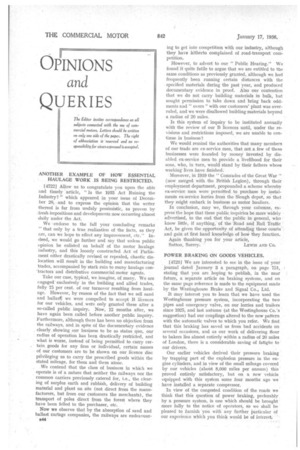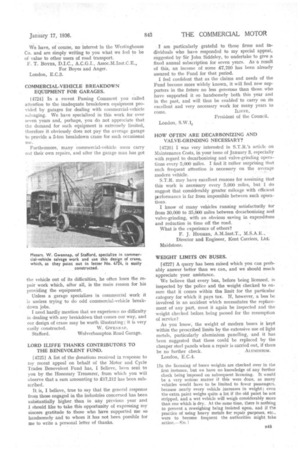OPINIONS
Page 58

Page 59

If you've noticed an error in this article please click here to report it so we can fix it.
and
QUERIES
ANOTHER EXAMPLE OF HOW ESSENTIAL HAULAGE WORK IS BEING RESTRICTED.
147221 Allow us to congratulate you upon the able and timely article, " Is the 1933 Act Ruining the Industry?" which appeared in your issue of December 20, and to express the opinion that the writer thereof is far from unduly pessimistic, as proven by :fresh impositions and developments now occurring almost daily under the Act.
We endorse to the full your concluding remarks " that only by a true realization of the facts, as they are, can we hope to effect any improvement, etc." Indeed, we would go further and say that unless public opinion be enlisted on behalf of the motor haulage industry, and this loosely constructed Act of Parliament either drastically revised or repealed, chaotic dislocation will result in the building and manufacturing trades, accompanied by stark ruin to many haulage contractors and distributive commercial-motor agents.
Take our case, typical, we imagine, of many. We are engaged -exclusively in the building and allied trades, fully 75 per cent, of our turnover resulting from haulage. However, by reason of the fact that we sell sand and ballast we were compelled to accept 33 lfcences for our vehicles, and were only granted these after a so-called public inquiry. Now, 12 months after, we have again been called before another public inquiry. Furthermore, although there has been no objection from the railways, and in spite of the documentary evidence . clearly showing our business to be as status quo, our radius of operation has been drastically restricted, and what is worse, instead of being permitted to carry certain goods for any firm or individual, certain names of our customers are to be shown on our licence disc privileging us to carry the prescribed goods within the stated mileage, for them and them alone.
We contend that the class of business in which we operate is of a nature that neither the railways nor, the common carriers previously catered for, i.e., the clearing of surplus earth and rubbish, delivery of building material and plant on site (not direct from the manufacturers, but from our customers the merchants), the transport of poles direct from the forest where they have been felled to the purchaser, etc.
Now we observe that by the absorption of sand and ballast cartage companies, the railways are endeavour844 ing to get into competition with our industry, although they have hitherto complained of road-transport competition.
However, to advert to our "Public Hearing." We found it quite futile to argue that we are entitled to the same conditions as previously granted, although we had frequently been running certain distances with the specified materials during the past year, and produced documentary evidence in proof. Also our contention that we do not carry building materials in bulk, but sought permission to take down and bring back oddments and" overs "with our customers' plant was overruled, and we were disallowed building materials beyond a radius of 20 miles.
Is this system of inquiry to be instituted annually with the review of our B licences until, under the revisions and restrictions imposed, we are unable to continue in business?
We would remind the authorities that many members of our trade are ex-service men, that not a few of these businesses were founded by money invested by disabled ex-service men to provide a livelihood for their sons, who, in turn, would stand by their fathers whose working lives have finished.
Moreover, in 1919 the "Comrades of the Great War' (now merged with the British Legion), through their employment department, propounded a scheme whereby ex-service men were permitted to purchase by instalments ex-service lorries from the Slough depot, so that they might embark in business as motor hauliers.
In conclusion, may we, through your columns, express the hope that these public inquiries be more widely advertised, to the end that the public in general, who know little, if anything, of the Road and Rail Traffic Act, be given the opportunity of attending these courts and gain at first hand knowledge of how they function.
Again thanking you for your article,
Sutton, Surrey. LEWIS AND CO.
POWER BRAKING ON GOODS VEHICLES.
[47231 We are interested to see in the issue of your journal dated January 3 a paragraph, on page 751, stating that you are hoping to publish, in the near future, a separate article on braking systems, and on the same page reference is made to the equipment made by the Westinghouse Brake and Signal Co., Ltd.
It may interest you to learn that we have used the Westinghouse pressure system, incorporating the two pipes and emergency valve, on our lorries and trailers since 1925, and last autumn (at the Westinghouse Co.'s suggestion) had our couplings altered to the new pattern with the automatic valves to which you refer. We find that this braking has saved us from bad accidents On several occasions, and as our work of delivering flour to bakers lies almost entirely within a radius of 20 miles of London, there is a considerable saving of fatigue to ' our drivers.
Our earlier vehicles derived their pressure braking by trapping part of the explosion pressure in the engine cylinders, and in view of the small mileage covered by our vehicles (about 8,000 miles per annum) this proved entirely satisfactory, but on a new vehicle equipped with this system some four months ago we have installed a separate compressor.
In view of the congested condition of the roads we think that this question of power braking, preferably by a pressure system, is one which should be brought more fully to the notice of operators, so we shall be pleased to furnish you with any further particular Of our experience which you think would be of interest. We have, of course, no interest in the Westinghouse Co. and are simply writing to you what we feel to be of value to other users of road transport.
F. T. BOYES, D.I.C., A.C.G.I., Assoc.M.Inst.C.E., For Boyes and Anger.
London, E.C.3.
COMMERCIAL-VEHICLE BREAKDOWN EQUIPMENT FOR GARAGES.
[4724] In a recent Passing Comment you called attention to the inadequate breakdown equipment provided by garages for dealing with commercial-vehicle salvaging. We have specialized in this work for over seven years and, perhaps, you do not appreciate that the demand for such equipment is extremely limited, therefore it obviously does not pay the average garage to provide a 5-ton breakdown crane for such occasienal use.
Furthermore, many commercial-vehicle users carry out their own repairs, and after the garage man has got
the vehicle out of its difficulties, he often loses the repair work which, after all, is the main reason for his providing the equipment.
Unless a garage specializes in commercial work it is useless trying to do odd commercial-vehicle break down jobs.
I need hardly mention that we experience no difficulty in dealing with any breakdciwn that comes our way, and our design of crane may be worth illustrating; it is very easily constructed. W. GWENNAP Stafford. Wolverhampton Road Garage.
LORD ILIFFE THANKS CONTRIBUTORS TO THE BENEVOLENT FUND.
[4725] A list of the donations received in response to my ,recent appeal on behalf of the Motor and Cycle Trades Benevolent Fund has, I believe, been sent to you by the Honorary Treasurer, from which you will observe that a sum amounting to 217,212 has been subscribed.
It is, I believe, true to say that the general response from those engaged in the industries concerned has been subitantially higher than in any previous year and I should like to take this opportunity of expressing my sincere gratitude to those who have supported rue so handsomely and to whom it has not been possible for me to write a personal letter of thanks. I am particularly grateful to those firms and individuals who have responded to my special appeal, suggested by Sir John Siddeley, to undertake to give a fixed annual subscription for seven years. As a result of this, an income of some £7,700 has been already assured to the Fund for that period.
I feel confident that as the claims and needs of the Fund become more widely known, it will find new supporters in the future no less generous than those who have supported it •so handsomely both this year and in the past, and will thus be enabled to carry on its excellent and very necessary work for many years to come.
President of the Council. London, S.W.1, HOW OFTEN ARE DECARBONIZING AND VALVE-GRINDING NECESSARY?
[47261 I was very interested in S.T.R.'s article on Maintenance Costs, in your issue of January 3, especially with regard to decarbonizing and valve-grinding operations every 5,000 miles. I find it rather surprising that such frequent attention is necessary on the average modern vehicle.
S.T.R. may have excellent reasons for assuming that this work is necessary every 5,000 miles, but I do suggest that considerably greater mileage with efficient performance is far from impossible between such operations.
I know of many vehicles running satisfactorily for from 30,000 to 35,000 miles between decarbonizing and valve-grinding, with an obvious saving in expenditure and reduction in time off the road.
What is the experience of others?
F. J. HUGHES, A.M.Inst.T., M.S.A.E., Director and Engineer, Kent Carriers, Ltd:. Maidstone.
WEIGHT LIMITS ON BUSES.
[47271 A query has been raised which you can probably answer better than we can, and we should much appreciate your assistance.
We believe that every bus, before being licensed, is inspected by the police and the weight checked to ensure that it comes within the limit for the particular category for which it pays tax. If, however, a bus be involved in an accident which necessitates the replacement of any part, must it again be inspected and the weight checked before being passed for the resumption of service?
As you know, the weight of modern buses is kept within the prescribed limits by the extensive use of light metals, particularly aluminium panelling, and it has been suggested that these could be replaced by the cheaper steel panels when a repair is carried out, if there be no 'further check. ALUMINIUM. London, E.C.4.
[In the licensing of buses weights are checked over in the first instance, but we have no knowledge of any further check being imposed on subsequent licensing. It would be a very serious matter if this were done, as many vehicles would have to be limited to fewer passengers, because nearly every vehicle increases in weight ; even the extra paint weighs quite a lot if the old paint be not stripped, and a wet vehicle will weigh considerably more than one which is dry. At the same time, there is nothing to prevent a reweighing being insisted upon, and if the practice of using heavy metals for repair purposes, etc.. were to become frequent the authorities might take
action 1




























































































